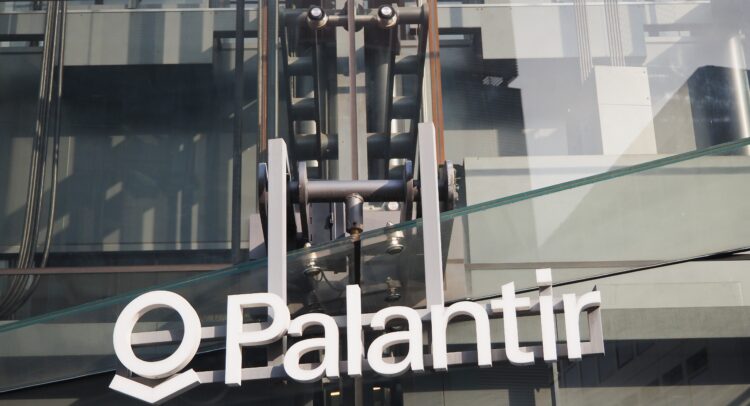One of the standout earnings reports this season came from Palantir Technologies (PLTR), which exceeded Q3 estimates and raised its guidance despite extremely high expectations surrounding the company. While I admire the company’s achievements and its AI potential, I had previously taken a cautious stance due to its stretched valuation—making the stock seem priced to perfection with little room for error. Given the strong post-Q3 valuation, I continue to maintain a neutral outlook.
Don't Miss our Black Friday Offers:
- Unlock your investing potential with TipRanks Premium - Now At 40% OFF!
- Make smarter investments with weekly expert stock picks from the Smart Investor Newsletter

That said, while it’s hard to justify the stock’s premium valuation, the progress Palantir has made this year is undeniable, making it equally difficult to adopt a bearish view. In this article, I’ll discuss the key takeaways from Q3 and explore why the market appears to be overlooking the company’s sky-high valuations.
Palantir’s Strong Q3 and Upbeat Outlook
Contrary to my cautious stance on Palantir, the company posted a blowout quarter on November 4. Revenues hit $725 million, a 30% year-over-year increase, surpassing estimates by $22 million. EPS came in at $0.10, beating expectations by one cent. As I noted in my earnings preview, only a positive guidance update could fuel a more bullish reaction, and that’s exactly what happened.
For Fiscal 2024, Palantir raised its revenue guidance to $2.805-$2.809 billion, up from $2.742-$2.750 billion, driven by stronger-than-expected growth in its U.S. commercial business, now projected to exceed $687 million (a 50% growth rate). The company also raised its adjusted income from operations to a range of $1.054 billion to $1.058 billion, up from the previous range of $966 million to $974 million.
Additionally, Palantir now expects over $1 billion in free cash flow, up from the previous range of $800 million to $1 billion. In other words, this was another quarter where Palantir increased its guidance, reflecting the strong demand for its highly sought-after AI software and services, particularly in the commercial sector with its AIP offering.
U.S. Commercial Segment: The Backbone of Palantir’s Growth
The key driver behind Palantir’s positive outlook stems from its progress in the U.S. commercial segment. Revenues are accelerating, driven by the success of Palantir’s AIP (“boot camp”) strategy of rapid AI adoption and deep customer integration. This has led to a 54% year-over-year and 133% quarter-over-quarter growth in commercial revenue.
What’s even more compelling is the potential for future growth. While Palantir’s U.S. commercial customer increase of 77% might seem high at first glance, when considering the actual number of customers—just 321—the opportunity for expansion becomes clear. This marks only a small slice of the millions of businesses across the U.S.
Given this, the opportunity for Palantir to expand its market share remains significant. As the company finds ways to deliver its services at a lower cost and continues to demonstrate its capabilities, growth in this segment is likely to remain robust.
Palantir’s Winning Strategy: Driving Revenue and Margins Simultaneously
To understand the bullish sentiment around Palantir among other investors, it’s important to recognize that the management team has executed a winning strategy of entering businesses, demonstrating Palantir’s capabilities, and securing deals. In fact, revenues grew by 30% in Q3, while adjusted operating margins increased to 38%, up from 37% last quarter.
This success also reflects the management team’s strong execution in controlling costs while driving revenue growth. Surprisingly, the new strategy has not led to a decrease in profit margins. Often, when companies implement new strategies, initial growth in sales can come at the expense of profit margins as they fine-tune their approach. However, that hasn’t been the case with Palantir.
Valuations Appear Even More Unrealistic
Despite the clear advances in Palantir’s business fundamentals, my skepticism about its investment thesis persists. It’s becoming increasingly difficult to justify the company’s valuation at these levels.
From a top-line perspective, Palantir is currently trading at a price-to-sales multiple of 40x for this year and around 33x for 2025. In terms of cash flows, the company is trading at an eye-watering 115x. Even Nvidia (NVDA), one of the biggest winners in the AI space, is trading at a stretched 70x price-to-cash flow, which now looks like a relative bargain compared to Palantir.
At this valuation, the only way forward for Palantir is growth that significantly exceeds expectations. This would require flawless execution of its strategy and no tolerance for setbacks. At 115x cash flow, all of Palantir’s achievements—such as the impressive Q3 results—seem, at least, to already be priced in.
The Bigger Picture: Valuation vs. Potential
While I have reservations about buying Palantir at such high valuations, it’s important to recognize that Palantir is a unique company. It has been able to meet the needs of both government and commercial entities globally in a way that no other competitor has managed to do, and the results reflect that.
I believe many of the company’s bullish investors see Palantir as a potential future “Big Tech” giant, perhaps reaching a trillion-dollar market cap in a few years. However, when we look at Palantir’s performance each quarter, we see the company consistently adjusting its projections as demand for its services evolves.
This suggests that even Palantir may not fully understand the full extent of its potential. Perhaps this uncertainty is why its future projections seem highly speculative, and, in the long run, its sky-high valuations could ultimately be justified. But that’s a risk I’m not comfortable taking.
Is PLTR A Buy, According to Wall Street Analysts?
At TipRanks, analysts rate PTLR stock as a Hold, with seven out of 16 analysts issuing neutral recommendations, another five providing bearish ratings, and only four offering bullish outlooks. In addition, the average PLTR price target is $29.00, indicating a downside potential of 47%.

Conclusion
I rate Palantir as a Hold. While its strong performance and growth potential are clear, it’s difficult to justify sustaining such high valuations for an extended period without major setbacks, which the market seems to be pricing in. As a result, I believe it’s too risky to join the rally at this point and prefer to remain on the sidelines.



















